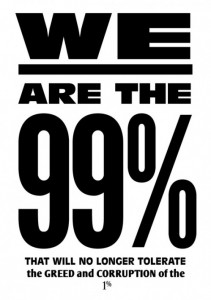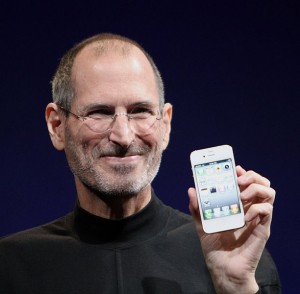Entries Tagged as 'Commerce 101'

I believe that some of the world’s greatest presenters are stand up comedians. Great comedians, such as Jerry Seinfeld, deliver presentations in front of colossal crowds; furthermore, they are masters of drawing the audience in, communicating their ideas clearly, and convincing the audience to agree. So how are they able to do this? First, they are able to draw the audience in with their confidence. The greatest comedians are also often the most confident. By moving around the stage, and speaking slowly and clearly, they indicate that they are confident and comfortable, naturally letting the audience lower their guards and drawing them in. Second, they are also able to communicate their ideas clearly by using effecting language, whether in words or in body. By using simple, understandable words, comedians are able to speak to the general audience without making them feel inferior. If the message is still unclear, great comedians often use body language to describe their words, making the message clearer. By drawing the audience in, and communicating their ideas clearly, they naturally convince the audience to agree, and often receive a howling response from the crowd. By examining great stand-up comedians, we can learn to deliver better presentations.
Tags: Commerce 101
 In my mind, Richard Branson and Virgin persist as one of the most entrepreneurial person and company. Not only are they unafraid to take risks, venturing into such competitive markets of mobile phones and airlines, but they are able to overcome the risks and become successful in their risky ventures. One of the ways Virgin distinguished itself in the airline and mobile phone industry is by recognizing the poor customer services in the industries, and then providing a new, more innovative way to provide the service, such as simple more leg room.
In my mind, Richard Branson and Virgin persist as one of the most entrepreneurial person and company. Not only are they unafraid to take risks, venturing into such competitive markets of mobile phones and airlines, but they are able to overcome the risks and become successful in their risky ventures. One of the ways Virgin distinguished itself in the airline and mobile phone industry is by recognizing the poor customer services in the industries, and then providing a new, more innovative way to provide the service, such as simple more leg room.
Furthermore, by offering such innovative services as Virgin Galactic, Virgin tapped into a very small, but also very profitable target market of the wealthiest, by offering consumers a chance to venture into space. Since Virgin is the only company offering space tourism, and space tourism is such a unique service with an incredibly low supply, Virgin holds monopoly over the space tourism industry, and is able to charge at incredibly high prices and generate great profits.
Virgin holds true to the definition of entrepreneurship, venturing into risky territory, and succeeding into the territory by providing innovative ways to do provide the service better, gaining tremendous wealth rapidly.
Tags: Commerce 101

Groupon, the originator of online group discount websites, soared in the stock markets on Friday after being initially offered to the public for $20 on Thursday. By the time the markets closed on Friday evening, shares of Groupon were selling for $27.19, an astounding 36% above the initial price. At this current value of $27.19, the company is valued at more than $17 billion, a seemingly ridiculous value, considering the recent problems that Groupon had with accounting, and the fact that, after the accounting adjustments, the company did not actually seem profitable. Yes, Groupon does have potential to grow, with more and more bargain hunters emerging everyday in the turbulent economy, and it has the advantage of being the first to tap into the target market, establishing its brand position; however, how long can they hold that position? Some of the biggest names in the internet industry, such as Google, are emerging as competitors with the launch of such projects as Google Offers. Google, a company with massive capital and brand recognition, could emerge as a threatening competitor in the future. Because of such negative factors as lack of profit and risk of competitors, it seems that the rise of the stock was mostly due to hype, and is a growing bubble, that is soon to pop.
Tags: Commerce 101
 On CBC Business today was an article called “Mining Watchdog Agency Called “Bogus PR Job“” This article states that Canada’s federal mining watchdog agency, which is supposed to keep Canadian mining companies operating abroad accountable for their actions in developing countries, is not performing its job competently, letting companies damage the environment and culture in developing countries. This connects to the topic of Occupy Wall Street, as well as sustainability and business ethics.
On CBC Business today was an article called “Mining Watchdog Agency Called “Bogus PR Job“” This article states that Canada’s federal mining watchdog agency, which is supposed to keep Canadian mining companies operating abroad accountable for their actions in developing countries, is not performing its job competently, letting companies damage the environment and culture in developing countries. This connects to the topic of Occupy Wall Street, as well as sustainability and business ethics.
First, the investigations are completely voluntary and the mining companies have the right to refuse investigation by the agency as a result of heavy lobbying by the mining companies against a bill that would’ve made the investigations mandatory. This presents a case of corporate influence in government decisions, which Occupy Wall Street is fighting against.
Furthermore, although the companies can refuse investigations, they cannot escape bad publicity, or bad company morale. The article names Excellon and HudBay Minerals as some of the offenders, which have been accused of being involved in violation of human rights. Not only is this concerning for the reader, but also for stockholders, who do not want to be associated with bad publicity. It is true that “great companies are good companies”
Tags: Commerce 101

In a blog post by Ernest Fung, Ernest mentions that Amazon’s newly introduced Kindle Fire could spark a tablet war. However, in my opinion, the Kindle Fire is a child’s play compared to the IPad, much like how Zune was a child’s play to the IPod.
First, with 67% of the Tablet market share and as the original tablet, the Apple IPad has established its brand position in the tablet industry. Furthermore, as an Apple product, with linkage to all apple products such as the iphone or the mcintosh, it has the loyalty of Apple’s huge customer base and can tap into the massive brand culture. As well, the Apple IPad is simply a better product than the other tablets in the current market. With a built in camera, IOS platform, massive, ever-growing appstore, bigger storage, and longer battery life, the IPad 2 has more than enough points of difference to distinguish itself from the rest, allowing it to raise its prices above the so called “competition”. Finally with Apple’s innovative brand image, it has the interest of potential customers, and current customers craving the newer and better.
Although Kindle Fire may offer a cheaper price, it remains a tiny competitor compared to the Apple IPad.
Tags: Commerce 101

Sparked by the successful revolutions in Tunisia and Egypt, Occupy Wall Street is a “people-powered movement… against the corrosive power of major banks and multinational corporations over the democratic process.” It intends to use a similar non-violent Arab Spring method of protest and with the motto “We are the 99%“, it has gained massive momentum, spreading to over 1500 cities including Vancouver.
Although this movement has gained momentum and media attention, I am sceptical of its future success. First of all, the movement has neither a clear goal nor a leader. Its purpose is to stop large corporations from influencing the government, but how? They don’t have clear evidences of corporate influences in the government or specific legislative bills that they want passed. Furthermore, the conditions in America do not match the conditions of needed for a revolution. Currently, Americans are not perceived to be oppressed, and are in fact in a recovery stage. There would have to be greater unemployment and poorer average living conditions for people to start revolting.
However, should the European economy collapse and trigger another world recession, this could be the movement that people will turn to for radical change.
Tags: Commerce 101

In a blog by Bill Taylor, Bill Taylor talks about why Steve Jobs matters to you. He states that by looking at Steve Job’s legacy upon his departure, you reflect upon your own life and ask, “What have I done?” You ask more of yourself as a leader and an innovator.
I absolutely agree with this article. Why Steve Job matters, why any great man matters, is change. Whether they change the world or change your life, they initiate change. With the example of Steve Jobs, he changed the world with innovation, founding successful companies such as Pixar and Apple, which produced some of the most innovative products such as the IPod, Macintosh and the IPhone. However, the invention of these gadgets is minimal compared to what he left us with upon his departure, inspiration. His story, his downfalls and his triumphs, inspires us to ask more of ourselves, and reminds us that he did not get to where he was by standing back and watching. He was a do-er and an initiator, and I know that the next time I see an opportunity, I’m not going to stand back and watch. I’m going to act.
Tags: Commerce 101
In Hannah Skurnik’s blog, Hannah brings up an intriguing point that the current European financial crisis is tarnishing Europe’s “brand” affecting the “products” it sells, such as tourism.

The term “brand” applied to a country led to a new perspective that perhaps a country is not so different from a corporation. Just as corporations market its product or service to potential consumers, countries market their exports, education system, and living standards to potential investors, immigrants and tourists. Through events such as the Olympics, countries are marketing their brand, similar to marketing campaigns of corporations. Furthermore, just as corporations try to position their products in specific target markets, countries try to position themselves in specific markets. For example, by branding itself a fast expand economy, China has been able to emerge as a leader within the investor’s market. Moreover, both corporations and nations act in its own interest. Although acts such as charitable events and bailouts may seem unselfish, in reality, they serve a benefit, whether boosting a corporation or country’s brand image or holding its own economy stable. When observed carefully, corporations and countries are amoral systems with numerous similarities.
Tags: Commerce 101
September 27th, 2011 · 1 Comment

All through out the class today, I was trying to think of an example of a product that has a very well established point of difference, and then it hit me. Smelly Markers! or more accurately, Mr.Sketch Scented Water Colour Markers, provide an excellent example of a product that has distinguished itself from the competition in an innovative way. As well as bright, fluorescent colours, the smelly markers add a delightful smell, leaving a nose and eye pleasing mark on your paper. However, despite it’s Point of Difference that makes it unique, it is still not the leading competitor in the marker market. Although it does not offer an extra benefit compared to the smelly markers, Magic Markers lead the competition. This is mainly because it was the first to establish its brand in the market, and the first one to be known for markers. After it had established its brand name for markers, it became harder for other competitors to oust it, no matter how much better their product was. This reinforces the fact that in marketing, it is better for a brand to position itself in the market first, rather than waste time trying to make innovative products.
Tags: Commerce 101
September 14th, 2011 · No Comments

Apparently we have to talk about ethics, not government intervention…
In Argentina, the 4 biggest grain producers, ADM, Bunge, Cargill and Dreyfus, are being accused of committing tax evasion on a astronomical scale, adding up to about $700,000,000 in unpaid taxes, as reported in the Guardian. The four grain producers say they will defend against Argentina’s allegation viciously, however, the legal costs alone will probably cost both sides in the millions.
In regards to business ethics, if the allegation hold true, the grain producers present poor ethical decisions, withholding tax money from the government, and ultimately the people which it profits from. Because of this whole ordeal, the legal fees alone will present a burden to argentina, already in economic stress, and also to the food costs, which has already risen tremendously over the past few years. The legal costs would have been completely unnecessary had the producers paid their taxes, and are unethical ways to spend money because, ultimately, the consumers are paying for it, whether in the tax payer’s money the Argentinian Government’s using to fight the battles, or in the increased food price.
Tags: Commerce 101










